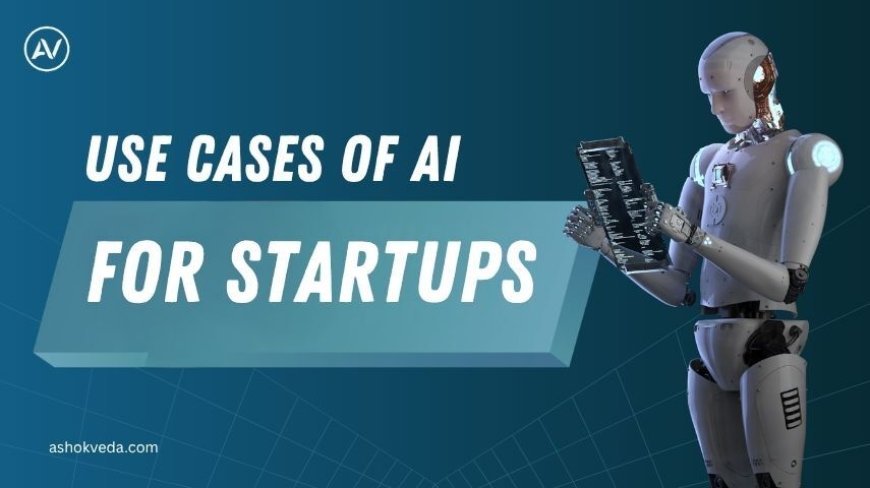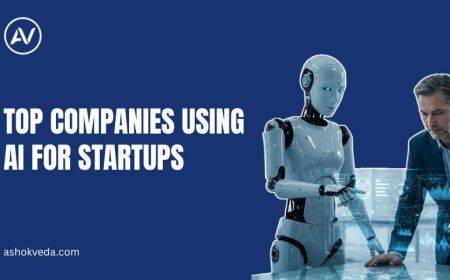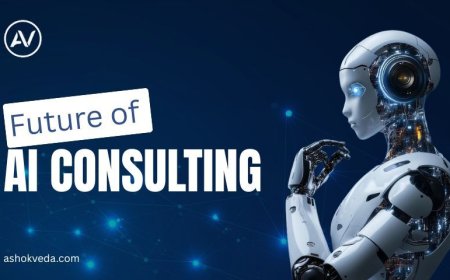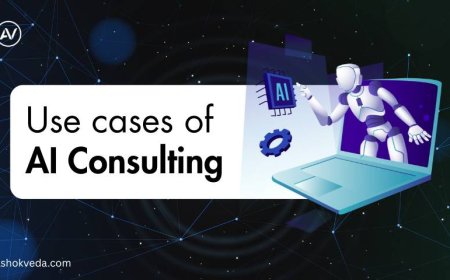10 Powerful Use Cases of AI for Startups
Explore the top use cases of AI for startups in 2025, from chatbots to analytics, driving growth, efficiency, and innovation.

Artificial intelligence (AI) has become a game-changer for startups, transforming how they operate, innovate, and compete. With over 78% of businesses adopting AI in at least one function, startups are harnessing its power to streamline operations, enhance customer experiences, and make smarter, data-driven decisions. AI-first startups are even growing 1.5 times faster than their competitors. Yet, despite this quick adoption, only 5% of companies report realizing measurable benefits from their AI initiatives. Understanding the right applications is key. In this blog, we explore the most impactful use cases of AI for startups in 2025 to drive growth and innovation.
Use Cases of AI for Startups
1. Enhancing Customer Support with AI Chatbots
Customer support is a critical area where AI is transforming startup operations. AI-powered chatbots provide 24/7 assistance, handle multiple queries simultaneously, and deliver personalized responses based on user behavior and preferences. Startups can use chatbots to troubleshoot common issues, guide customers through products or services, and even process simple transactions. This not only improves customer satisfaction but also reduces the workload on human support teams, allowing them to focus on complex or high-priority tasks. By leveraging AI chatbots, startups can scale their support efficiently, enhance engagement, and create a seamless, responsive customer experience.
2. Streamlining Operations with AI Automation
Startups often face resource constraints, and AI automation can be a game-changer. By automating repetitive and time-consuming tasks—such as inventory management, payroll processing, or supply chain logistics—AI helps reduce errors, save time, and improve operational efficiency. Predictive analytics can forecast demand, optimize stock levels, and even manage scheduling, allowing startups to scale without proportionally increasing overhead costs. Beyond cost savings, AI-driven automation frees teams to focus on strategic initiatives, innovation, and customer engagement. Implementing AI in operations ensures smoother workflows, faster decision-making, and a foundation for sustainable growth.
3. Personalizing Marketing Strategies with AI
AI empowers startups to create highly personalized marketing campaigns by analyzing customer behavior, preferences, and interactions. Machine learning algorithms can segment audiences, predict customer needs, and recommend tailored products or services. This enables startups to send the right message to the right person at the right time, improving engagement and conversion rates. AI-driven tools like predictive analytics, sentiment analysis, and adaptive content optimization allow marketers to make data-backed decisions and optimize campaigns continuously. By leveraging AI, startups can build stronger customer relationships, enhance brand loyalty, and maximize the return on their marketing investments.
4. Accelerating Product Development with AI Insights
AI is revolutionizing product development for startups by providing data-driven insights that reduce time and cost. By analyzing market trends, customer feedback, and competitor offerings, AI helps identify opportunities, predict product success, and highlight potential issues before launch. Startups can use AI to simulate user interactions, test prototypes virtually, and gather actionable feedback, enabling faster iteration cycles. This not only accelerates the development process but also ensures products are aligned with market needs. Leveraging AI insights allows startups to innovate efficiently, deliver products that resonate with users, and gain a competitive edge in rapidly evolving markets.
5. Optimizing Financial Management with AI
Financial management is critical for startups, and AI can transform how finances are monitored and planned. AI-powered tools analyze financial data, forecast cash flows, detect anomalies, and identify cost-saving opportunities. Machine learning algorithms can also assist in budgeting, investment decisions, and risk assessment, ensuring startups make informed choices. Additionally, AI can monitor compliance with regulations and flag irregularities, reducing the risk of financial mismanagement. By leveraging AI in financial operations, startups gain real-time insights, improved accuracy, and smarter resource allocation, enabling them to maintain financial stability while focusing on growth and innovation.
6. Enhancing Recruitment Processes with AI
Hiring the right talent is crucial for startup success, and AI streamlines recruitment by automating resume screening, analyzing candidate profiles, and conducting initial assessments. Machine learning algorithms can match candidates’ skills and experiences with job requirements, predict cultural fit, and reduce unconscious bias in hiring decisions. AI tools also help prioritize applicants, schedule interviews, and even assess soft skills through behavioral analysis. This accelerates the hiring process, improves the quality of hires, and reduces human error. By integrating AI into recruitment, startups can build strong, capable teams efficiently, ensuring the right talent drives innovation and growth.
7. Driving Sales Growth with AI-Powered Insights
AI enables startups to analyze customer behavior, sales trends, and market dynamics, providing actionable insights to drive revenue growth. Machine learning algorithms can identify high-potential leads, predict customer needs, and recommend personalized sales strategies. Startups can use AI to optimize sales funnels, prioritize prospects, and tailor outreach for maximum impact. Predictive analytics also helps forecast demand and allocate resources efficiently. By incorporating AI in sales processes, startups can increase conversion rates, shorten sales cycles, and make data-driven decisions, ultimately boosting revenue while building stronger relationships with customers.
8. Strengthening Cybersecurity with AI
As startups grow, protecting sensitive data becomes paramount, and AI plays a vital role in cybersecurity. AI-powered systems can detect unusual patterns, identify potential threats, and respond to attacks in real time, minimizing risks. Machine learning algorithms continuously analyze network traffic and user behavior, predicting breaches before they occur. AI can also automate security monitoring, vulnerability assessments, and threat mitigation, reducing reliance on manual intervention. By integrating AI into cybersecurity, startups can protect customer data, safeguard intellectual property, and maintain trust, ensuring that their growth is not compromised by security challenges.
9. Facilitating Data-Driven Decision Making with AI Analytics
Data is a startup’s most valuable asset, and AI analytics transforms raw data into actionable insights. Machine learning algorithms can analyze large datasets to uncover patterns, trends, and correlations that inform strategic decisions. Startups can leverage AI to evaluate customer behavior, optimize operations, and refine marketing campaigns. Predictive analytics enables teams to anticipate market shifts and make informed, proactive choices, thereby reducing risk. By incorporating AI-driven analytics, startups gain faster, smarter, and more accurate decision-making capabilities, enabling them to respond effectively to opportunities and challenges, ultimately improving their performance and gaining a competitive edge.
10. Navigating Legal and Compliance Challenges with AI
Startups face complex legal and regulatory requirements, and AI can simplify compliance management. AI tools analyze contracts, monitor regulatory changes, and flag potential risks, reducing the burden on legal teams. Machine learning algorithms can detect inconsistencies, ensure adherence to data privacy laws, and automate reporting processes. By leveraging AI for compliance, startups minimize the risk of penalties and legal disputes while maintaining transparency and accountability. This allows founders and teams to focus on growth and innovation with confidence. Integrating AI into legal workflows ensures startups remain compliant, proactive, and well-prepared for regulatory challenges.
AI has emerged as a transformative force for startups, offering tools and insights that drive growth, efficiency, and innovation. From enhancing customer support with chatbots to optimizing financial management, personalizing marketing campaigns, and strengthening cybersecurity, the applications are vast and impactful. AI empowers startups to make data-driven decisions, accelerate product development, and build high-performing teams, ensuring they remain competitive in fast-paced markets. However, realizing measurable value requires a strategic approach, skilled talent, and continuous optimization. By understanding and implementing these use cases of AI for startups, founders can harness the technology effectively, foster innovation, and create sustainable growth that benefits both their business and customers.





































